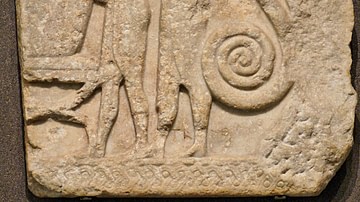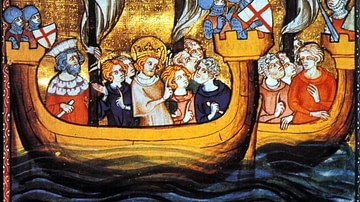Search Definitions
Browse Content (p. 162)

Definition
Agamemnon (Play)
The play Agamemnon was written by one of the greatest Greek tragedians Aeschylus (c. 525 – 455 BCE), “Father of Greek Tragedy.” Older than both Sophocles and Euripides, he was the most popular and influential of all tragedians of his era...

Definition
Agamemnon (Person)
Agamemnon was the legendary king of Mycenae and leader of the Greek army in the Trojan War of Homer's Illiad. Agamemnon is a great warrior but also a selfish ruler who famously upset his invincible champion Achilles, a feud that prolonged...

Definition
Augusta Raurica
Augusta Raurica is a former Roman colony and city located on the Rhine River some 11 km (7 miles) east of the modern Swiss city of Basel, in between the towns of Kaiseraugst and Augst. Founded by Lucius Munatius Plancus (90 BCE - 15 BCE...

Definition
Romanos IV Diogenes
Romanos IV Diogenes ruled the Byzantine Empire from 1068 to 1071 CE. He was a military emperor, and his policies and campaigns served to shore up Byzantine defenses against the Seljuk Turks. However, in the aftermath of the Byzantine defeat...

Definition
Eighth Crusade
The Eighth Crusade of 1270 CE was, like the Seventh Crusade (1248-1254 CE), led by the French king Louis IX (r. 1226-1270 CE). As previously, the idea was to attack and defeat the Muslims first in Egypt and then either reconquer or negotiate...

Definition
Saint Gall
Saint Gall (c. 550 - c. 645 CE), also known as Saint Gallus, was an Irish monk who lived in what is present-day Switzerland during the 6th century CE and was one of twelve companions of Saint Columbanus' Christian mission to the European...

Definition
Seventh Crusade
The Seventh Crusade (1248-1254 CE) was led by the French king Louis IX (r. 1226-1270 CE) who intended to conquer Egypt and take over Jerusalem, both then controlled by the Muslim Ayyubid Dynasty. Despite the initial success of capturing Damietta...

Definition
Hovenweep
Hovenweep or Hovenweep National Monument is comprised of the ruins of six Ancestral Puebloan (or Anasazi) villages located on the border between southwestern Colorado and southeastern Utah in what is the present-day United States. The home...

Definition
Sixth Crusade
The Sixth Crusade (1228-1229 CE), which for many historians was merely the delayed final chapter of the unsuccessful Fifth Crusade (1217-1221 CE), finally saw the Holy Roman Emperor Frederick II (r. 1220-1250 CE) arrive with his army in the...

Definition
Vinland
Vinland (Old Norse Vínland, 'Wine Land') is the name given to the lands explored and briefly settled by Norse Vikings in North America around 1000 CE, particularly referring to Newfoundland, where a Viking site known as L'Anse aux Meadows...